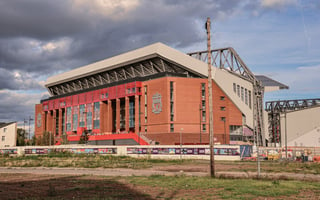Just when you wondered if our divided nation could ever be united again, football found a way of...
Apology videos can be a great way for organisations to show contrition when they are in the spotlight for the wrong reasons.
Many brands and individuals are now using them when they find themselves faced by a crisis media management situation.
But they are not all made equally.
One of the most recent ones we saw simply failed to find the target.
It came from Peter Lawwell, the chief executive of Celtic Football Club, after a few days of intense scrutiny.
The club had found itself in the firing line after making an ill-fated 3,500 mile trip to Dubai for a training camp during a pandemic.
This resulted in one player - who was taken on the trip despite having a long-term injury - testing positive for covid and 16 other people, including the team’s manager, needing to self-isolate.
And then there were the pictures that emerged from the training camp, which many, including the Scottish First Minister Nicola Sturgeon, have suggested might show covid restrictions were not being followed particularly vigorously.
"I do have doubts, based on how the club itself described it, about whether Celtic's trip to Dubai was really essential,” she said.
"I have doubts based on some pictures I've seen whether adherence to bubble rules was strict enough.”
The optics of swanning off to the Middle East during a global health crisis and enjoying a few beers by the poolside at a time when many supporters are barely able to leave their homes were bad enough. And when the team did return to the pitch, those that could play only managed a demoralising draw.
And eventually, the apology video was released.
It took the form of an interview, recorded for the club TV, that was then clipped and released on social media as ‘a message to our supporters’.
A Message to Our Supporters.
— Celtic Football Club (@CelticFC) January 13, 2021
What stood out for me was the language of the apology. Mr Lawwell said: “We apologise profusely.”
How does that make you feel? Does it appear genuine? Sound authentic? Or, like something he and the club thought they should say?
Imagine, instead, he had said: “I’m sorry.”
A simple change, but it feels different, doesn’t it? It’s more believable, remorseful and suggests that the person at the top is taking responsibility.
What I also found strange about the video is that having apologised for making the trip, Mr Lawwell then went on to spend several minutes defending it and painting Celtic as victims, saying covid had affected the club "more than" any other.
The best apology videos are often the ones that are succinct - and that is not just because people have short attention spans. The longer you talk and start explaining what has happened, the more it sounds like you are trying to excuse what has taken place.
The line between explanation and excuse is thin in crisis media management and any hint of the former will detract from an apology.
But perhaps the biggest failing is that the club and its bosses seemed to almost have to be dragged into recognising the issues caused by the trip and apologising for them.
When it first put out a statement confirming the ‘Dubai 16’ situation, the statement substituted contrition for defensiveness.
“The reality is that a case could well have occurred had the team remained in Scotland, as other cases have done in Scottish football and across UK sport in the past week,” it said.
A similar tone was struck by Gavin Strachan, who led the team in the absence of those who were self-isolating. He said: “There’s regret that one person has caught the virus but there’s not a regret in terms of the permission we got to go and the protocols that we followed, which we have done the whole season. It’s regrettable that we got one positive, which we could have got at any time.”
It was only after the demands for an apology grew from fans, former players, pundits and the media that the club changed its tone-deaf tune and apologised.
But, as we’ve already shown, even that delayed apology failed to strike the right note.
Shocking statement, apologise for going to Dubai then spends two minutes defending the circumstances for going ?? Pointless, come out and take responsibility for it and accept it. Time to go Peter
— Max Van Haeften (@MaxVanHaeften) January 13, 2021
Very disappointing from PL ... Had to be pished to give a statement and even then it’s full of excuses ... Too little too late for us supporters !
— celticghirl1888 (@celticghirl0106) January 13, 2021
"I'm sorry"
— Paul McQueen (@queenmachine67) January 13, 2021
"But this is why I was right...."
Apologising for something he has zero remorse for. They still don't see what they done as wrong.
Only apologising because you feel it will make the situation better. A fake, forced apology has just made it worse.
It would be hard to conclude that this was anything other than a mess. So, how can you avoid making similar own goals?
Here’s a quick recap of the key learning from this saga.
Timely
If you are going to make an apology video, make sure it is timely. Don’t wait until people are demanding you say ‘sorry’. Do it quickly and start to control the story.
One of the great things about video is you can now record and edit it on your smartphone, so there is no reason why you cannot quickly produce one.
Language
Language matters. There is a big difference between “we apologise profusely” and “I am sorry”.
Succinct
Keep it short and don’t get drawn into saying anything that could be viewed as an excuse.
Need some help with your crisis comms? Take a look at our new online Essential Crisis Management course, starting at just £195 + vat.
Media First are media and communications training specialists with more than 35 years of experience. We have a team of trainers, each with decades of experience working as journalists, presenters, communications coaches and media trainers.
Subscribe here to be among the first to receive our blogs.




